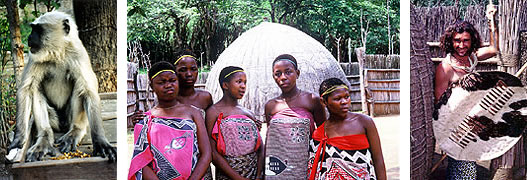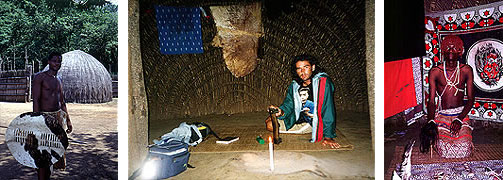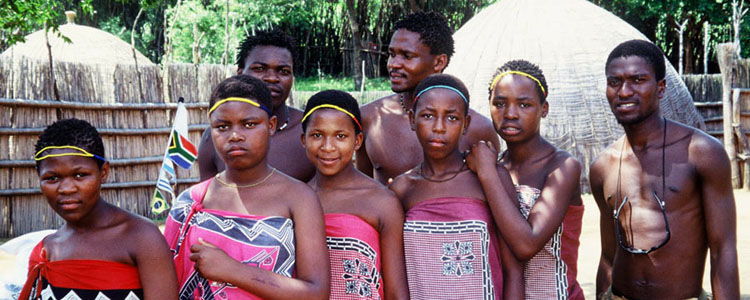December 01, 2001

Swazi people wear animal’s leathers and use lances and shields. They told me that as all African, the victory of a family father is to have many daughters. Their customs consisted on giving them to the marriage in exchange for cows.
Km 14,568

Swaziland is a small monarchy that limits with South Africa and Mozambique.
This tiny country, of hardly 400 kms of extension and mountainous landscape presents similar features to their neighboring South Africa.
I went by Manzini, one of the most important cities, where I stopped to carry out certain formalities. I left my bike in the housing of Matsapha to go more comfortable. Likewise, with a bag in hand, I was noticed three times by people of the place about my ingenuousness when walking so unworried. Here, like in many places of South Africa, it is advisable not to circulate at night along the streets: being white man and tourist is something that in more than one occasion can play in against.
I could find several banks, but all put difficulties when changing traveler’s checks, which forced me to think about going on with the rest of my trip in these lands.
I completed my trip in the city with some internet (every time more difficult to find) and later, before the sun went down, I went as a soldier to the lodging where I began with the preparations to return to the routes.
Swazi Indians
During my cycle I stopped in a village, called Mantenga Swazi, where some few dozens of straw shacks were in a small valley beside the river.
When walking for those streets I had the sensation of being inside a movie. Its big labyrinths made me lose the notion of the space where I was going.
In spite of the fact that their dialect is the swazi, I found Xahama, whom I was able to communicate in English.

The first thing that surprised me was the quantity of monkeys that I crossed when I was arriving to the village. Later, I discovered that monkeys cooked in a saucepan were the favorite dish of Xahama. When he described me how they hunted them throwing stones in their heads, I began to hallucinate that in that lost town I could occupy one of their enormous saucepans, too.
People of the place, dressed with animal’s leathers and carrying lances and shields in their hands, insisted me to wear their clothes.
Then they told me that as all African, the victory of a family father is to have many daughters. Their customs consisted on giving them to the marriage in exchange for cows. But the change in Mantenga Swazi was more expensive than in Zululand: while the Zulu’s requested 11 cows for a woman without children, here they quoted them at 17. In the afternoon it began to rain, which forced me to ask them for shelter until the other day.
At once the rain began to flood the corridors of the village and I should take refuge in one of their shacks. I could appreciate them in the inside: they are only handmade constructions of straw and flexible branches, and they take more than 30 days in building them with their own hands.

Swazi people live on their cultivation and under a monarchist regime. As their ancestors, they practice the astrology and the sorcery.
They have their Sangoma, too, who works in medicine on the fortune and the future.
In the evening we share the dinner and still with the stomach claiming me, I went to bed in another of their shacks, yearning that the rain, the following day, allowed me to continue.
USEFUL DATA
WHEN TO GO:
The rainy time in Swaziland is in summer, although you can visit it anyway.
HOW TO GET THERE:
You can get there from Durban, Johannesburg or Maputo (Mozambique´s Capital).
The prices of the transports don’t overcome 20 US$.
WHERE TO STAY:
Swaziland Backpackers: swazilandbackpackers@realnet.co.sz
It is a housing located in Matsapha, between Manzini and Mbabane.
It receives foreign tourism and it has different programs to do during the day and at night.
Assisted by its owner: Karina
RECOMMENDATIONS:
Although it is a small country, it is worthwhile to remain some days and to know their monarchist regime and the people.
There are different communities that still conserve their customs and it is worthwhile to visit.
GRATEFULNESS AND SUPPORT:
The Swazi River Café: rivercafe@realnet.co.sz
Swaziland Backpackers


